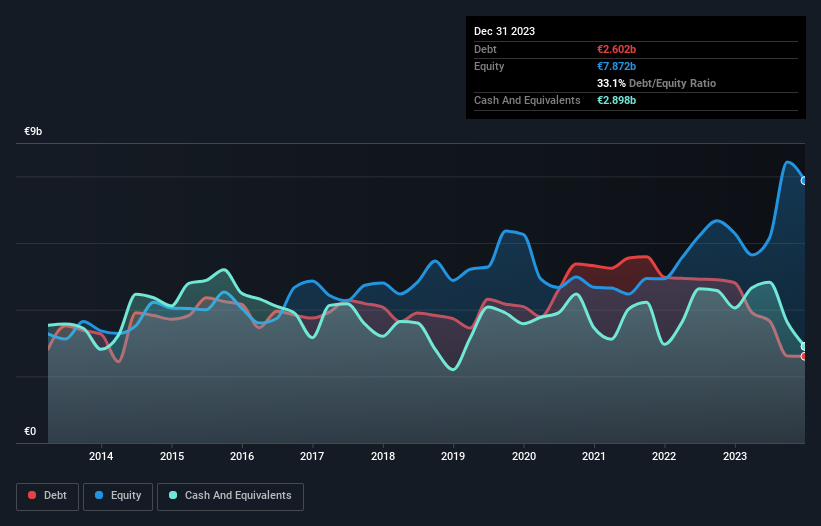
Howard Marks put it nicely when he said that, rather than worrying about share price volatility, 'The possibility of permanent loss is the risk I worry about... and every practical investor I know worries about.' So it seems the smart money knows that debt - which is usually involved in bankruptcies - is a very important factor, when you assess how risky a company is. As with many other companies Ryanair Holdings plc (ISE:RYA) makes use of debt. But the more important question is: how much risk is that debt creating?
When Is Debt Dangerous?
Generally speaking, debt only becomes a real problem when a company can't easily pay it off, either by raising capital or with its own cash flow. In the worst case scenario, a company can go bankrupt if it cannot pay its creditors. However, a more usual (but still expensive) situation is where a company must dilute shareholders at a cheap share price simply to get debt under control. Of course, plenty of companies use debt to fund growth, without any negative consequences. The first thing to do when considering how much debt a business uses is to look at its cash and debt together.
See our latest analysis for Ryanair Holdings
How Much Debt Does Ryanair Holdings Carry?
As you can see below, Ryanair Holdings had €2.60b of debt at December 2023, down from €4.81b a year prior. But it also has €2.90b in cash to offset that, meaning it has €296.2m net cash.

How Strong Is Ryanair Holdings' Balance Sheet?
Zooming in on the latest balance sheet data, we can see that Ryanair Holdings had liabilities of €4.29b due within 12 months and liabilities of €3.30b due beyond that. Offsetting these obligations, it had cash of €2.90b as well as receivables valued at €76.5m due within 12 months. So its liabilities total €4.61b more than the combination of its cash and short-term receivables.
Since publicly traded Ryanair Holdings shares are worth a very impressive total of €23.3b, it seems unlikely that this level of liabilities would be a major threat. However, we do think it is worth keeping an eye on its balance sheet strength, as it may change over time. While it does have liabilities worth noting, Ryanair Holdings also has more cash than debt, so we're pretty confident it can manage its debt safely.
In addition to that, we're happy to report that Ryanair Holdings has boosted its EBIT by 45%, thus reducing the spectre of future debt repayments. When analysing debt levels, the balance sheet is the obvious place to start. But ultimately the future profitability of the business will decide if Ryanair Holdings can strengthen its balance sheet over time. So if you're focused on the future you can check out this free report showing analyst profit forecasts.
Finally, while the tax-man may adore accounting profits, lenders only accept cold hard cash. Ryanair Holdings may have net cash on the balance sheet, but it is still interesting to look at how well the business converts its earnings before interest and tax (EBIT) to free cash flow, because that will influence both its need for, and its capacity to manage debt. Over the most recent two years, Ryanair Holdings recorded free cash flow worth 54% of its EBIT, which is around normal, given free cash flow excludes interest and tax. This free cash flow puts the company in a good position to pay down debt, when appropriate.
Summing Up
While Ryanair Holdings does have more liabilities than liquid assets, it also has net cash of €296.2m. And it impressed us with its EBIT growth of 45% over the last year. So is Ryanair Holdings's debt a risk? It doesn't seem so to us. There's no doubt that we learn most about debt from the balance sheet. But ultimately, every company can contain risks that exist outside of the balance sheet. For instance, we've identified 1 warning sign for Ryanair Holdings that you should be aware of.
Of course, if you're the type of investor who prefers buying stocks without the burden of debt, then don't hesitate to discover our exclusive list of net cash growth stocks, today.
New: AI Stock Screener & Alerts
Our new AI Stock Screener scans the market every day to uncover opportunities.
• Dividend Powerhouses (3%+ Yield)
• Undervalued Small Caps with Insider Buying
• High growth Tech and AI Companies
Or build your own from over 50 metrics.
Have feedback on this article? Concerned about the content? Get in touch with us directly. Alternatively, email editorial-team (at) simplywallst.com.
This article by Simply Wall St is general in nature. We provide commentary based on historical data and analyst forecasts only using an unbiased methodology and our articles are not intended to be financial advice. It does not constitute a recommendation to buy or sell any stock, and does not take account of your objectives, or your financial situation. We aim to bring you long-term focused analysis driven by fundamental data. Note that our analysis may not factor in the latest price-sensitive company announcements or qualitative material. Simply Wall St has no position in any stocks mentioned.
About ISE:RYA
Ryanair Holdings
Provides scheduled-passenger airline services in Ireland, the United Kingdom, Spain, Italy, and internationally.
Excellent balance sheet with moderate growth potential.


